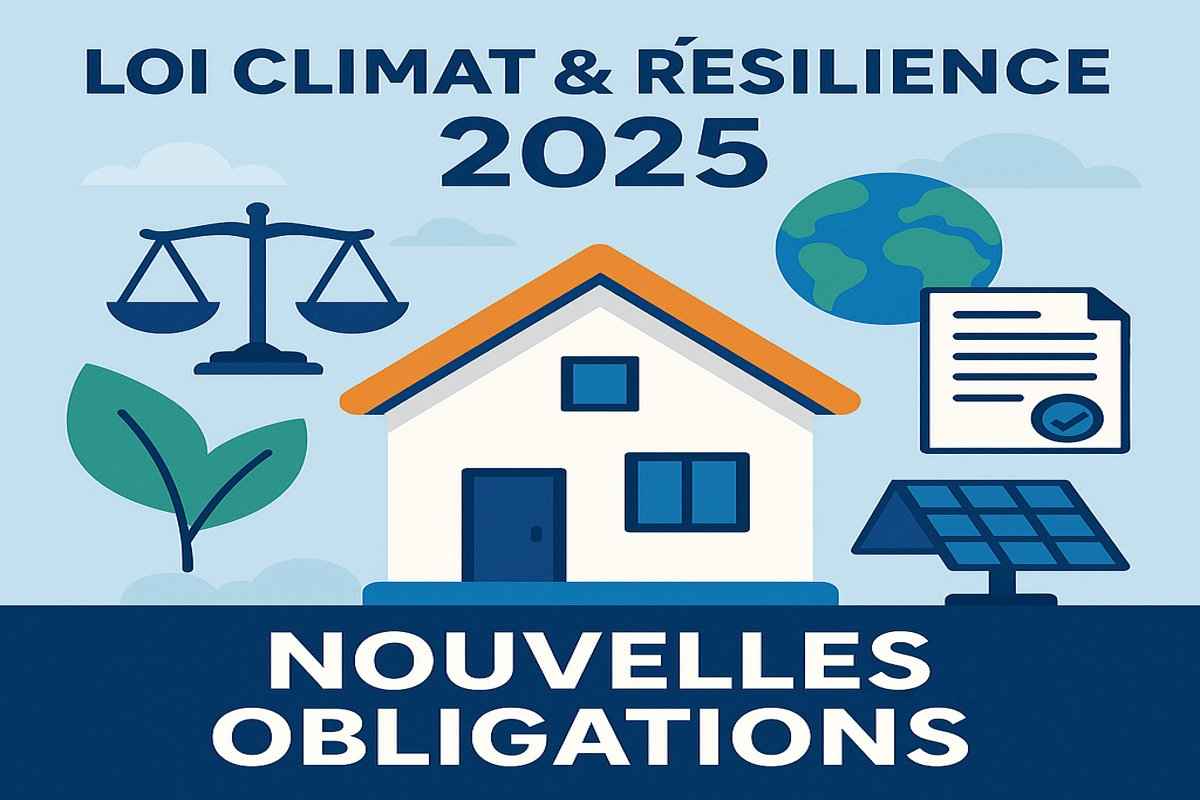2025-08-25
Climate and Resilience Law: What New Obligations for Property Owners in 2025?
As a property owner, you are directly affected by changing environmental regulations. Discover what’s changing in 2025 with the Climate and Resilience Law.

The Climate and Resilience Law, now fully in effect, imposes new obligations on sellers, landlords, and co-owners. At BARNES Bordeaux, we support our clients in enhancing the value of their assets while taking these new standards into account: energy audits, co-ownership obligations, renovation subsidies, impact on resale…
Let’s break down together what is concretely changing in 2025 with the Climate and Resilience Law, in order to better anticipate, renovate, or sell under the best conditions.
Key Takeaways
- Since January 2025, all properties rated G are banned from rental, without exception.
- An energy audit is mandatory when selling properties rated E (already in force for F and G).
- Co-ownerships must comply with new obligations, including the collective energy performance diagnosis (DPE) and the Multi-Year Work Plan (PPT).
- Energy-inefficient homes suffer a price discount at resale and generate greater reluctance among buyers.
- Subsidies are available to help finance renovation work.
Climate and Resilience Law: What Is Its Purpose?
Adopted in August 2021, the Climate and Resilience Law aims to accelerate France’s ecological transition, in line with the goal of carbon neutrality by 2050.
Born from the work of the Citizens’ Climate Convention, it addresses several areas: transport, consumption, urban planning, agriculture, and especially housing, which alone accounts for 44% of national energy consumption.
In the real estate sector, the law seeks to reduce the number of energy-inefficient properties (homes rated F or G in the DPE), encourage their renovation, and restrict their rental or resale without work being carried out.
The goal is clear: improve the energy performance of homes and fight against energy poverty, while mobilizing owners through obligations and financial incentives.
Rental Bans: What Changes in 2025
The Climate and Resilience Law gradually regulates the rental of the most energy-intensive properties.
Since January 2023, G-rated homes consuming more than 450 kWh/m²/year have been considered unfit for rental and can no longer be rented out.
Since January 1, 2025, this ban now applies to all G-rated homes, regardless of their energy consumption. They can no longer be offered for rent, even in the case of lease renewal or a new tenancy agreement.
Next step: F-rated homes will be banned from rental in 2028, followed by E-rated homes in 2034.
The goal is clear: to compel owners to carry out energy renovation work before being able to rent out their properties again.
Energy Audit Becomes Mandatory: For Whom, When, How?
Since January 1, 2025, owners of E-rated properties must provide an energy audit when selling. This requirement has already applied to F- and G-rated properties since 2022, and will extend to D-rated homes in 2034.
The audit only applies to single-owner properties, such as individual houses or apartments outside co-ownership.
This document comes in addition to the DPE. It must detail the property’s energy performance, propose renovation scenarios, estimate their cost and impact on consumption, and list the available subsidies.
It is mandatory from the moment of listing and must be given to the buyer during the very first visit.
Co-ownership: New Obligations as of January 1, 2025
The Climate and Resilience Law introduces new obligations for co-ownerships to encourage energy renovation:
- Mandatory collective DPE: as of January 1, 2025, co-ownerships with between 51 and 200 units must have a collective energy performance diagnosis, updated every 10 years.
- Multi-Year Work Plan (PPT): co-ownerships with fewer than 50 units must establish a plan outlining the works to be carried out over 10 years to maintain the building and improve energy efficiency.
- Generalized renovation fund: until now reserved for large co-ownerships, this fund becomes mandatory for all co-ownerships, regardless of size.
These measures aim to plan and finance renovations while anticipating future environmental requirements.
Selling an Energy-Inefficient Property in 2025: What Consequences and What Solutions?
With the new obligations of the Climate and Resilience Law, owners of F- or G-rated homes must now anticipate the consequences of a sale. These so-called “energy sieves” suffer an average price discount of 4%, sometimes more in less competitive markets. Sales can also take longer, as buyers are often reluctant due to the scale of necessary work.
Nevertheless, some investors see these properties as an opportunity for renovation and value creation, particularly thanks to the subsidy programs available. MaPrimeRénov (suspended until September 2025), the zero-interest eco-loan, reduced VAT, and energy savings certificates all help to reduce costs.
To properly identify the work to be undertaken, it is recommended to seek support from a professional or a specialized service such as France Rénov’. The now-mandatory energy audit also helps owners project into the future more clearly.
Unsure whether your property can still be rented out or sold without renovations? Worried about a price discount due to a poor DPE rating? Don’t know where to start to prepare for upcoming deadlines?
Get guidance from a BARNES Bordeaux expert!
Our consultants specialized in high-end real estate in Bordeaux will guide you every step of the way: property valuation, DPE analysis, energy audit, renovation advice, and sales strategy. Book an appointment today for tailored support!


